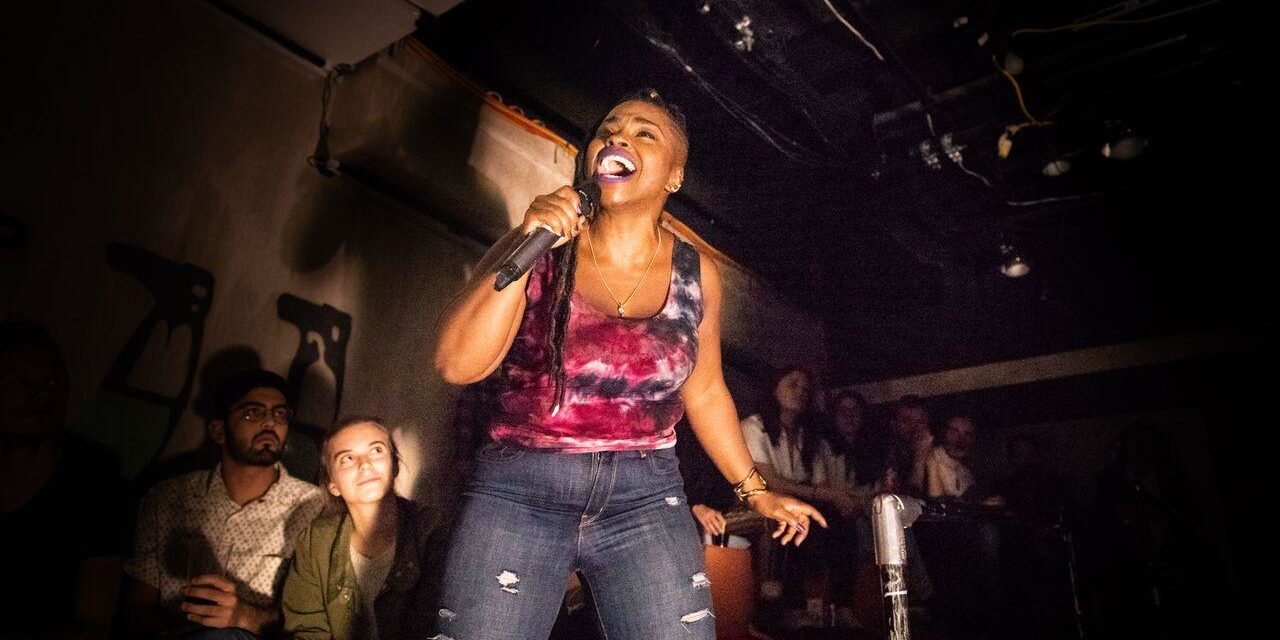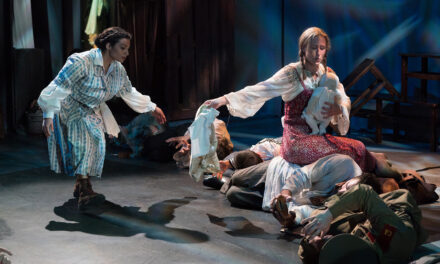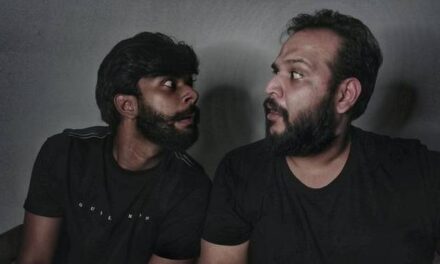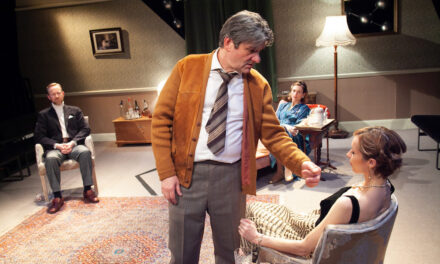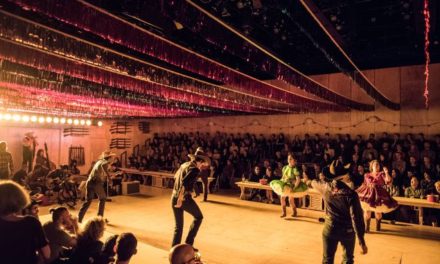What forces in today’s society will retain their power three hundred years into the future? According to Rags Parkland Sings The Songs Of The Future, playing until November 1oth at Ars Nova in mid-town Manhattan, it will be fear, love, bravery and folk music. Rags Parkland transforms the already intimate space of Ars Nova into a den of subcultural conspirators. Billed as a sci-fi folk concert, the play teleports us into a future where the United States has been reorganized as a confederation of regional republics, and human beings share the land, and the labor, with androids.
Rags Parkland is the brainchild of Andrew R. Butler, and he stars as the Dylanesque title character, a freewheelin’ and folk-singin’ fugitive. The show begins with him alone on stage, playing banjo or guitar, sometimes harmonica, and singing about his background: a religiously zealous father, working conditions in a Martian labor camp, and a perfectly old-fashioned love story. With the patter between songs he begins to populate the rest of his world with figures from the music underground, some of them recognizable, like Woody Guthrie, and some fictional, like Rags’ lost love Beaux Weathers (not, as I first thought he said, Bill Withers). Some of Rags’ solo numbers veer into self-satisfied righteous indignation, but the play is rescued when Rags’ memory carries us into the near-past, the time of his collaboration and romance with Beaux.
Stacey Sargeant as Beaux is the savior the underground needs, and the audience joins Rags in falling in love with her. With the entrance of Beaux, whose voice is warm, honeyed, and powerful, along with her band The Future, the setting becomes an illegal secret club where all the spectators, namely us, are initiated into the resistance. She informs us “if you stay, you’re liable to be guilty of the federal offense of ‘applauding and appreciating illegal intelligences.’” Beaux and her bandmates, despite their human forms, are “constructeds,” AKA robots, and their anti-authoritarian music is strictly forbidden. When Beaux invites us to sing along to the rousing We Are And We Are, we become part of the uprising.
The excellent band consists of a bassist (Debbie Christine Tjong) refusing to abide by the rule that bassists don’t emote), an accordionist (Rick Burkhardt) constructed, tenured and deconstructed at the University of Chicago’s Music Department and a drummer (Jessie Linden) who “speaks” by means of a thumb harp. The energy they bring rounds out the production, and the very wise choice not to indicate through costume or makeup that they are anything other than human drives home the play’s point about constructed personhood.
Sargeant’s performance is inviting and empowering, and it’s a pity there isn’t more chemistry between her and Butler. Their love song duet is one of the best numbers in the show, but his supposed bashfulness comes off as recalcitrance. You’d think a guy could stop playing games during an intergalactic class war… Rags’ solo numbers are meant to pay tribute to the band, and what the second act shows us is that there’s only so much you can do alone. When Rags performs the mournful ballad Stella Charlemagne, he says Beaux “did a hell of a version,” and when she performs a refrain in act two, it’s no less gratifying for being predictable. The same cannot be said of the club owner’s “precautionary” explanation of the alarm system that goes off in the event of a police raid, a set-up so lacking in tension, it flips the safety on Chekhov’s gun.
The play presents “illegal intelligences” and “deconstruction” as twin menaces; one threatens from the bottom up, the other from the top down. If you’re not a sci-fi fan, you might find an emotional foothold in the folk tunes that illustrate the story. But if you are a sci-fi devotee, you might wonder how this genre of music, more dusty than metallic, fits the scenario. In fact, folk music has always celebrated outlaws, outcasts, and rebels. And lest we forget, Luke Skywalker was a farmer first. To be honest, I’m no great fan of either folk music or sci-fi, but I am a sucker for an impossible love story. And that’s where Butler’s production earns its place as the rightful heir to Ars Nova’s tradition of the first-rate experimental theater because Rags Parkland isn’t a folk concert or a work of science fiction at all. It’s story-telling, simple and heartbreakingly human, at its finest.
This post was written by the author in their personal capacity.The opinions expressed in this article are the author’s own and do not reflect the view of The Theatre Times, their staff or collaborators.
This post was written by Abigail Weil.
The views expressed here belong to the author and do not necessarily reflect our views and opinions.

